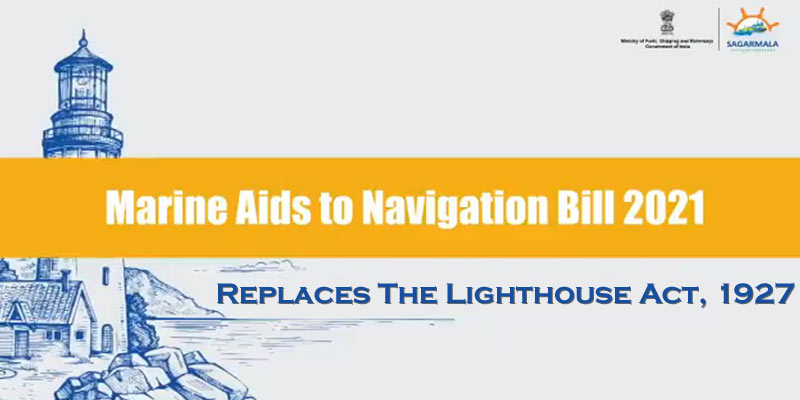- India
- Jul 28
Parliament passes Marine Aids to Navigation Bill
The Parliament passed the Marine Aids to Navigation Bill, 2021, which will replace the over nine-decade-old Lighthouse Act, 1927 governing lighthouses and provide a fresh framework to establish and manage vessel traffic services.
The Bill aims to incorporate the global best practices, technological developments and India’s international obligations in the field of marine aids to navigation.
What is the significance of this Bill?
• The administration and management of lighthouses and lightships in India is governed by the Lighthouse Act, 1927 for safe navigation.
• During the enactment of Lighthouse Act, 1927, there were only 32 lighthouses in India spread across six regions — Aden, Karachi, Bombay, Madras, Calcutta and Rangoon.
• Post-Independence, 17 lighthouses came under the administrative control of India, which have now increased manifold to meet the growing needs of the shipping industry.
• Currently, there are 195 lighthouses and number of advanced radio and digital aids to navigation administered under the said Act.
• As the technology evolved, systems were put in place, where with the help of radar and other sensors, vessels were advised from shore about the position and thus vessel traffic services (VTS) came into existence and found wide acceptability.
• These modern, technologically improved aids to marine navigation systems have changed their profile from a ‘passive’ service to that of ‘passive as well as interactive’ service.
• Lighthouses have also been globally identified as a major tourist attraction due to scenic location, typical architecture and heritage value.
• The new Act was necessitated to provide an appropriate statutory framework which reflects the modern role of marine aids to navigation and to be in compliance with India’s obligations under international conventions.
Highlights of the Bill:
• Improved legal framework for matters related to aids to navigation and vessel traffic services and covers the future developments in the field of marine navigation.
• Management of vessel traffic services for enhancing the safety and efficiency of shipping and to protect the environment.
• Skill development through training and certification for the operators of aids to navigation and vessel traffic services at par with international standards.
• Auditing and accreditation of institutes to cater to the need of training and certification at par with global standards.
• Marking of “wreck” in general waters to identify sunken/stranded vessels for safe and efficient navigation.
• Development of lighthouses for the purpose of education, culture and tourism, which would tap the tourism potential of coastal regions and contribute to their economy.
Manorama Yearbook app is now available on Google Play Store and iOS App Store

